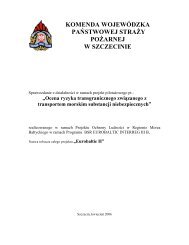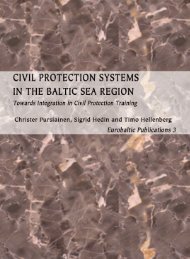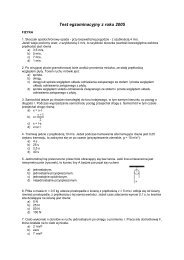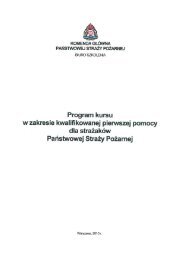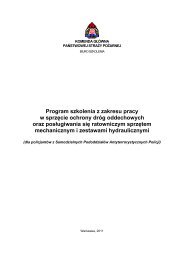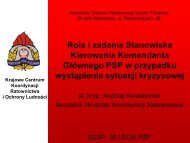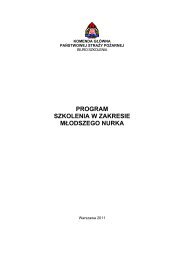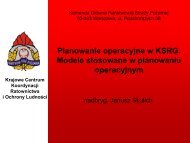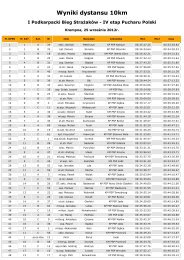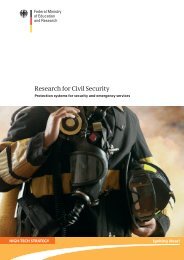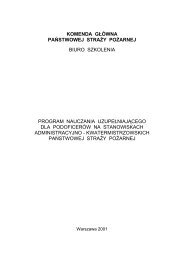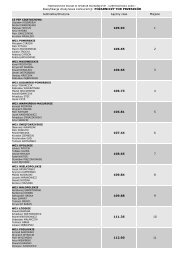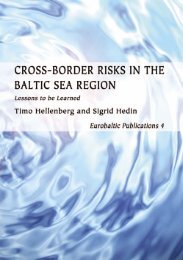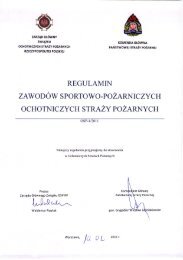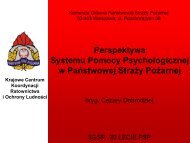Towards a Baltic Sea Region Strategy in Critical ... - Helsinki.fi
Towards a Baltic Sea Region Strategy in Critical ... - Helsinki.fi
Towards a Baltic Sea Region Strategy in Critical ... - Helsinki.fi
Create successful ePaper yourself
Turn your PDF publications into a flip-book with our unique Google optimized e-Paper software.
CRITICAL INFRASTRUCTURE PROTECTION IN THE BALTIC SEA REGION<br />
on the development of technical systems with little value for practical day-to-day<br />
work.<br />
The Estonian and F<strong>in</strong>nish authorities expressed the view that one central<br />
problem <strong>in</strong> putt<strong>in</strong>g forward new safety enhanc<strong>in</strong>g regulations <strong>in</strong> this <strong>fi</strong>eld is the<br />
meta-conflict between EU and Russia. A meta-conflict approach is one that can<br />
address the many facets of a conflict, be they structural (political or constitutional<br />
arrangements, legislation, economic or other factors) or psycho-cultural (attitudes,<br />
relationships, divided histories) <strong>in</strong> a comprehensive and complementary manner<br />
(Fitzduff 1989 and 2004). All the regulations and procedures agreed among EU<br />
Member States are, one could almost say, naturally contested by the Russians, if<br />
such regulations taken as a start<strong>in</strong>g po<strong>in</strong>t for mar<strong>in</strong>e safety cooperation. It should<br />
be mentioned here aga<strong>in</strong> that Russian safety regulations are also well developed.<br />
Thus, a prerequisite for good EU – Russian cooperation is to use as a po<strong>in</strong>t of<br />
departure those procedures and regulations that seem to be close to both Russian<br />
and European practices. This requires, among other th<strong>in</strong>gs, knowledge about the<br />
way the Russian MA <strong>in</strong>terprets <strong>in</strong>ternational maritime law and regulations.<br />
Cooperation based on partnership and common will<br />
Hard law comes through the EU and eventually the IMO, but actually the work<strong>in</strong>g<br />
procedures (traf<strong>fi</strong>c surveillance and control) adopted by mar<strong>in</strong>e safety authorities<br />
of all three countries have been ga<strong>in</strong>ed through cooperation on the level of<br />
professional, practitioners. Thus, the role of regional cooperation is accentuated <strong>in</strong><br />
enhanc<strong>in</strong>g the safety of <strong>Baltic</strong> <strong>Sea</strong> energy transportation. It seems that this type of<br />
somewhat <strong>in</strong>formal cooperation may be the best way to enhance safety, <strong>in</strong> the<br />
sense that the steps taken towards cooperation are not obliged by the law, but<br />
result from practical need. It is therefore evident that a mere top-down approach<br />
does not improve the situation, but respond<strong>in</strong>g to and moreover anticipat<strong>in</strong>g the<br />
actual close-call traf<strong>fi</strong>c situations do. This is even more apparent when operators<br />
have to deal with ships that are operat<strong>in</strong>g accord<strong>in</strong>g to different environmental,<br />
technical and social standards.<br />
The hard core of the safety-enhanc<strong>in</strong>g system was agreed among mar<strong>in</strong>e<br />
authorities, although the adoption of the GOFREP system itself is mandated<br />
through the IMO. Most procedures that guarantee safety <strong>in</strong> the Gulf of F<strong>in</strong>land are<br />
based, therefore, on agreed standards of procedure. In this light, the most<br />
important feature <strong>in</strong> safety cooperation <strong>in</strong> the <strong>Baltic</strong> <strong>Sea</strong> is this type of day-to-day<br />
jo<strong>in</strong>t work between the professional maritime safety authorities of the three<br />
countries. As a result, the th<strong>in</strong>gs agreed <strong>in</strong> the Document of Jo<strong>in</strong>t Procedures, the<br />
document of the three MAs to def<strong>in</strong>e and describe the th<strong>in</strong>gs to be done and<br />
followed by operators on a very detailed level, go far further than the IMO<br />
GOFREP obligation demands.<br />
This is also a tacit criticism of IMO policy, which only concentrates on ship<br />
safety itself and not on traf<strong>fi</strong>c control systems. The criticism is justi<strong>fi</strong>ed not least<br />
because the need for this type of a system that is much more demand<strong>in</strong>g towards<br />
ship navigation is also globally evident.<br />
160 NORDREGIO REPORT 2007:5



